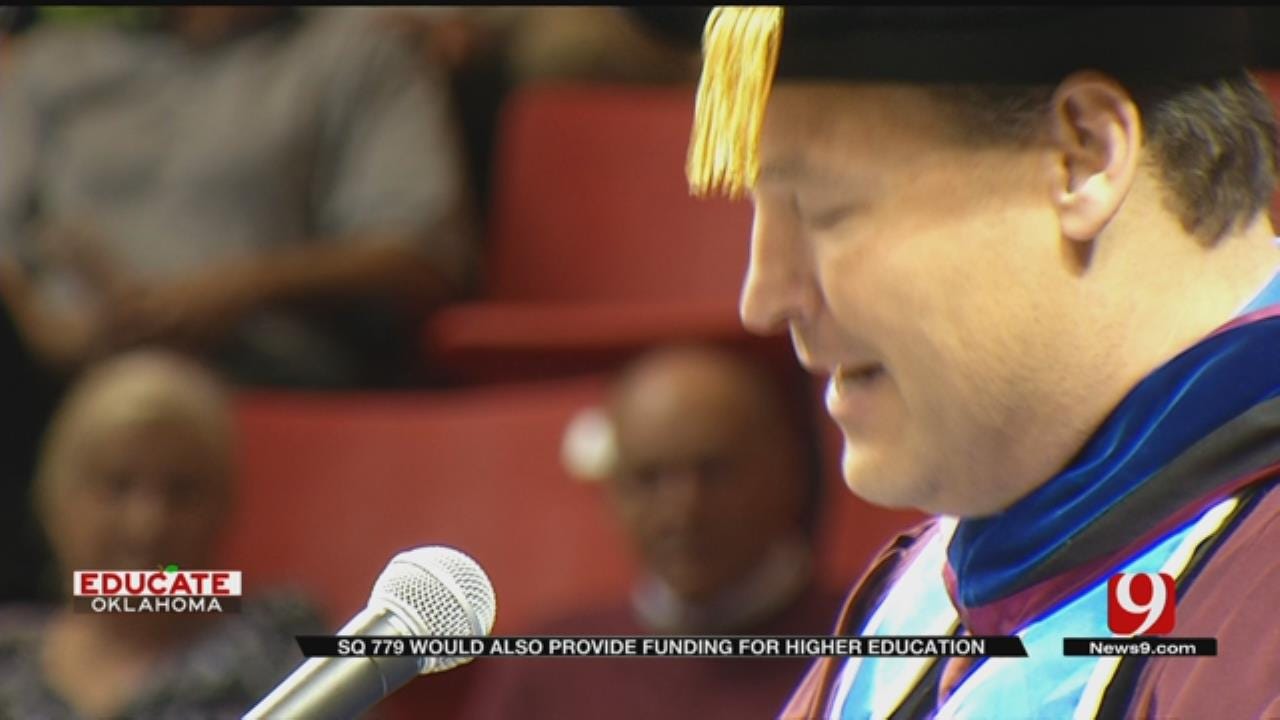State Question 779 To Also Provide Funding For Higher Education
<p>Of the seven state questions appearing on the November 8 ballot, SQ 779 may be most familiar to Oklahomans, as it would guarantee a substantial pay raise for public school teachers through a one-percent increase in the state sales tax. </p>Wednesday, October 19th 2016, 6:11 pm
Of the seven state questions appearing on the November 8 ballot, SQ 779 may be most familiar to Oklahomans, as it would guarantee a substantial pay raise for public school teachers through a one-percent increase in the state sales tax.
It's estimated the penny in sales tax will generate about $615 million annually, more than enough to fund the salary hike. Some opponents of the measure don't believe voters understand that, if they vote 'yes', they're voting to fund far more than just a teacher pay raise.
"I think that definitely Oklahomans should be aware," said Jonathan Small, President of the Oklahoma Council of Public Affairs, "and look at who's leading the charge and who benefits the most from this."
OCPA is an Oklahoma City-based think-tank, advocating free market, anti-tax policies. OCPA Impact, the organization's political arm, filed two lawsuits trying to prevent SQ 779 from getting on the ballot.
The ballot language voters will see explains that 69.5 percent of revenues derived from the additional sales tax will go to common education; it also explains that those funds must be used to "raise teacher salaries by at least $5,000 over the salaries paid in the year prior to adoption of this measure."
It also notes that 19.25 percent of the funds will go to higher education. It's expected that will amount to approximately $120 million annually.
What concerns Small and OCPA is that the question imposes no specific spending restrictions on that money.
"The new money that will go to higher ed in this ballot question," opined Small, "goes directly to whatever the regents in the current system want to spend it on."
Small says the regents -- and the institutions they oversee -- have a poor track record when it comes to the efficient use of the tax dollars they receive, and believe they only latched on to the populist teacher salary issue as a way to secure a new source of funding.
"You'll notice they are not talking about all the money that will go to higher education, that is not how this is being promoted," Small stated. "It's being promoted as the teacher pay raise."
Supporters of 779 couldn't disagree more.
"We make no secret that there's funding in here to make sure our colleges and universities can do the job to educate our kids," said Amber England, Executive Director of Stand for Children, one of numerous education advocacy groups supporting 779.
England says the question addresses education in Oklahoma as a whole, and that higher education is a critical part of that. More to the point, she says, the $120 million will help offset drastic, recent cuts in state funding for higher education, and help keep state schools affordable.
"It's going to be used on scholarships and financial aid to keep college tuition down," England said.
On that point, there appears to be room for debate.
The original ballot language proposed by the group that filed the initiative did include this line: "It allocates funds for specific institutions and purposes related to the improvement of public education, such as increasing...college affordability..." But during Attorney General Scott Pruitt's routine review of the measure, that language was removed.
In its July 18, 2016 ruling on one of OCPA Impact's lawsuits, the Oklahoma Supreme Court noted that the Attorney General concluded the proposed ballot title did not comply with applicable laws for several reasons, including this:
"It suggests that allocated funds will, in part, be used to improve college affordability, when the measure indicates that the funds may be used for college affordability or for otherwise improving higher education. That is, funds may be allocated in whole, in part, or not at all for college affordability."
Still, England and other 779 proponents say they have pledged to use the higher education portion of sales tax funds to make college more affordable, and the proof will be evident. England says every penny that goes to higher education will be audited every year, so taxpayers will know how the money's been spent
"There is accountability in how this funding is going to be spent," England said.
More Like This
October 19th, 2016
November 13th, 2024
October 28th, 2024
October 17th, 2024
Top Headlines
January 2nd, 2025
January 2nd, 2025
January 2nd, 2025










